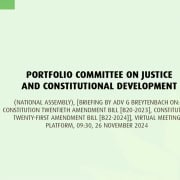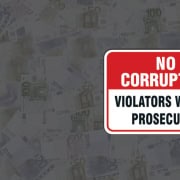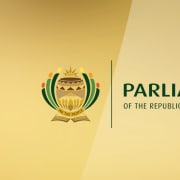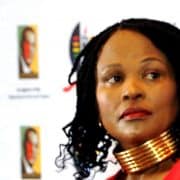|
Getting your Trinity Audio player ready...
|
Advocate Kholeka Gcaleka only just garnered the required 60% majority of votes in the 19 October National Assembly (NA) debate on her appointment to become the next public protector. Things grew heated in the House and the opposition DA walked out, but nonetheless there are now just two steps remaining before Gcaleka is officially appointed as public protector – the NA will recommend that President Cyril Ramaphosa appoint her, and the president will do so.
Gcaleka needed 240 votes from National Assembly (NA) members – she got 244. Five fewer, and the motion would have failed, indicating how divided the NA was on the issue of her appointment.
She succeeds the impeached Busisiwe Mkhwebane, whose term would have ended on 14 October had Ramaphosa not removed her on 13 September, following the findings of a parliamentary committee, convened in terms of Section 194(3)(b) of the Constitution, which found her unfit to hold office.
“I think it’s fair to say that under the previous public protector, the office was really brought into disrepute,” said Corruption Watch’s executive director Karam Singh in an interview on e.tv News after the debate. “One would hope that the new public protector would take the opportunity to turn the corner and to re-establish the credibility of that office.”
Over and above a well-functioning Office of the Public Protector, Singh added, there is still a gap in the country’s law enforcement infrastructure.
“There is a need for us to take the bull by the horn and to establish an independent anti-corruption agency dedicated agency … It’s a body that’s going to have to have specialised powers, or specialised resources, dedicated resources, and special protections around its independence, so it doesn’t become subject to political interference.”
However, said Singh, it is too early to talk just yet about turning the corner.
“When we see these high profile arrests, we have to applaud the police for their investigations for getting to that point, but we know that arrests, in and of themselves, are not the end of the accountability story. We’re looking for successful prosecutions and successful asset recovery, and a real situation where we know that those inside the system that are complicit … are also brought to book.”
There is still a long way to go, Singh concluded.
Distasteful
The debate took a distasteful turn when the DA left the House after a verbal altercation arising from a comment made by that party’s Glynnis Breytenbach in a speech. The DA MP – a former state prosecutor herself – insinuated that while Gcaleka was a prosecutor at the National Prosecuting Authority, her relationship with her former boss, erstwhile National Director of Public Prosecutions Menzi Simelane, was improper, even “very intimate”.
Questions have also been raised about Gcaleka’s connection to former minister Malusi Gigaba, for whom she was an advisor. Simelane and Gigaba were both controversial figures during their tenures. There was opposition to Simelane’s appointment before it was even made, while Gigala is implicated in state capture, referred to indeed as one of its architects.
NA Speaker Nosiviwe Mapisa-Nqakula asked Breytenbach to withdraw her comment, which she refused to do, leading to the speaker ordering Breytenbach to leave the House. Insults were traded. The DA walkout followed soon after.
The EFF and ATM have also registered strong opposition to Gcaleka’s appointment.
“We note the appointment of Adv Kholeka Gcaleka by 244 of Members of the House,” said DA Chief Whip Siviwe Gwarube in a statement. “While we opposed this appointment, we will continue to hold the Public Protector to account and ensure that this office serves the people of South Africa diligently.”








